Useful distinctions from Erich Fromm’s book On Disobedience

Useful distinctions from Erich Fromm’s book On Disobedience

From Erich Fromm, On Disobedience (nearly every line of this book so far is worth quoting):
In order to disobey, one must have the courage to be alone, to err and to sin. But courage is not enough. The capacity for courage depends on a person’s state of development. Only if a person has emerged from mother’s lap and father’s commands, only if he has emerged as a fully developed individual and thus has acquired the capacity to think and feel for himself, only then can he have the courage to say “no” to power, to disobey.
A person can become free through acts of disobedience by learning to say no to power. But not only is the capacity for disobedience the condition for freedom; freedom is also the condition for disobedience. If I am afraid of freedom, I cannot dare to say “no,” I cannot have the courage to be disobedient. Indeed, freedom and the capacity for disobedience are inseparable; hence any social, political, and religious system which proclaims freedom, yet stamps out disobedience, cannot speak the truth.
John Halstead has written an thoughtful post on prayer from a non-theistic perspective. (John believes that the threat of climate change is going to lead to civilizational collapse but you don’t need to have any opinion on that subject to read this.) I had similar negative feelings about petitionary prayer for a long time after leaving Christianity. I’m still not a person who prays - because, thankfully, I’ve not had any great personal upheavals in the past few years - but I’ve developed an attitude toward prayer similar to John’s. The post is also interesting for its incorporation of the thought of SF writer Octavia Butler.
For the last several months in response to all this, I’ve been reading about solitude and silence - and making some attempts at practice. No one needs me to tell them that the world is in trouble. What I’m looking for is a way to live with the trouble, without falling into the destructive patterns of behavior we see around us. It seems that more silence is either a way to that way, or the way itself.
Obviously, when I talk about the value of silence, I’m not talking about absolute, unending silence; otherwise I’d be quite a hypocrite for writing this. My interest is in silence as a space to inhabit, however temporarily, and from which to act.
The non-action of the wise man is not simply inaction.
It is not a studied thing and thus cannot be upset by anything.
The sage is quiet, not because he wills to be quiet
but because he is not unsettled.
(Zuangzhi, as found in Beaulac, Sitting with Lao-Tzu)
Silence separates you from the multitude of voices that would control you. It is a way to understand yourself as yourself and clarify your mind. Acting out of that place, rather than in reaction to the multitude of voices, is far better. Thomas Merton:
He who attempts to act and do things for others or for the world, without deepening his own self-understanding, freedom, integrity, and capacity to love, will not have anything to give others. He will communicate to them nothing but the contagion of his own obsessions, his aggressiveness, his ego-centered ambitions, his delusions about ends and means, his doctrinaire prejudices and ideas. (Thomas Merton, Contemplation in a World of Action)
All of this, by the way, I write aspirationally - because I know how noisy my own head is and how tempted I am to stop resisting the ever-present distractions. It is a real struggle to separate yourself from the insanity of social media and cable news and scrolling scrolling scrolling. Listen, life is hard and you’re an adult, so you’re free to do with your life what you want. Just make sure it is what you want in your deepest self.
Some good writing on this subject:
Merton’s essay is particularly rich - and his struggle with his monastic superiors to get the solitude he wanted is also instructive. (I can’t find where I read about that but I’ll link it here if I can find it.) One of the lines that spoke most deeply to me is the following. My reasons for withdrawal weren’t nearly so grand - I just wanted some peace! - but I love the idea of healing in yourself the wounds you see in the world.
Such men, out of pity for the universe, out of loyalty to mankind, and without a spirit of bitterness or of resentment, withdraw into the healing silence of the wilderness, or of poverty, or of obscurity, not in order to preach to others but to heal in themselves the wounds of the entire world. (Thomas Merton, “Notes for a Philosophy of Solitude”)